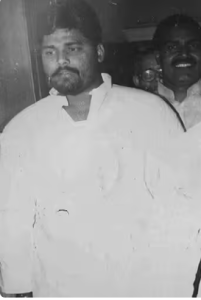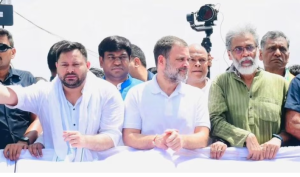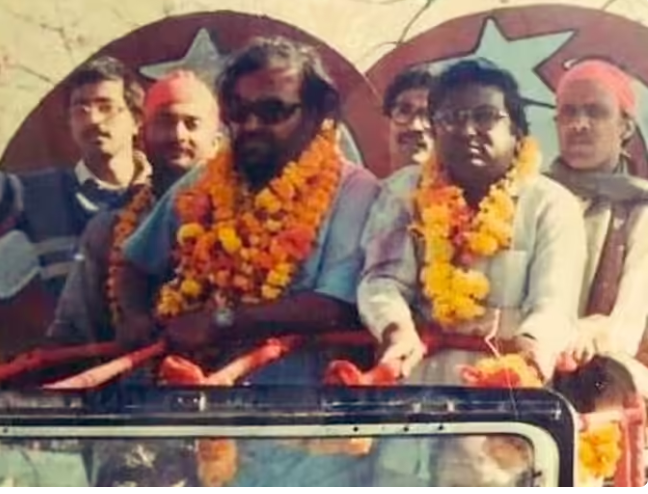Ajit Sarkar’s story is one of extraordinary courage and humility. In an era when Bihar’s politics was dominated by goons and wealth, Sarkar’s approach was revolutionary. His election campaigns were not backed by lavish funds or armed militias but by the trust of the people. Spreading a towel in the market and collecting one-rupee coins from passersby, Sarkar turned small contributions into a symbol of grassroots support. Each coin represented a vote, a belief in his vision for a just society. Living in a rented house in Purnia’s Durgabari locality, with his wife Madhavi, a schoolteacher, bearing the household expenses, Sarkar remained untouched by the greed that defined his contemporaries. Even after four terms as an MLA, he owned no personal property, a rarity in a political landscape where power often translates to wealth.
Sarkar’s simplicity and commitment to the marginalized made him a target. On June 14, 1998, as he moved through Purnia, he was ambushed and gunned down in a hail of bullets-107 shots, a chilling testament to the hatred he inspired among those who sought to exploit the region. The involvement of figures like Rajesh Ranjan, alias Pappu Yadav, who spent eight years in jail for the murder, and the broader context of Lalu Prasad’s “Jungle Raj” underscored the lawlessness that Sarkar’s killers thrived in. His death was a blow to the Marxist movement and a reminder of the cost of standing against entrenched power.

Fast forward to July 9, 2025, when Dipankar Bhattacharya stood alongside Rahul Gandhi and Tejashwi Yadav during the “Bihar Bandh” protest in Patna, opposing the Election Commission’s Special Intensive Revision (SIR) of electoral rolls. This image of unity among the Congress, RJD, and CPI(ML) leaders is jarring when viewed through the lens of Ajit Sarkar’s legacy. Tejashwi Yadav, heir to Lalu Prasad’s political empire, has been vocal in his support for figures like Shahabuddin, a convicted criminal and murderer of CPI(ML) leader Chandrashekhar. Pappu Yadav, now an Independent MP aligned with Congress, carries the stain of his association with Sarkar’s killing. Yet, Dipankar, a supposed torchbearer of Marxist principles, chose to share a platform with these individuals, raising serious questions about his commitment to the ideals he claims to uphold.
Is Dipankar ashamed of this alliance? The evidence suggests otherwise. The CPI(ML) has increasingly aligned itself with the Mahagathbandhan, a coalition that includes RJD and Congress, in a bid to challenge the BJP-JD(U) alliance in the 2025 Bihar Assembly elections. This pragmatic move, however, comes at a steep ideological cost. Marxism, at its core, rejects the compromises of bourgeois politics, yet Dipankar’s presence alongside Tejashwi and Rahul signals a willingness to prioritize power over principle. The CPI(ML)’s announcement to contest 40-45 seats in the upcoming polls further indicates a calculated strategy to secure a foothold in Bihar’s power structure, even if it means aligning with parties whose histories clash with Marxist values.
The RJD’s legacy under Lalu Prasad is one of caste-based politics and governance marred by corruption and lawlessness—hardly the stuff of Marxist dreams. The Congress, too, has a chequered history in Bihar, often playing second fiddle to regional powers while failing to address the systemic inequalities that Sarkar fought against. For Dipankar to stand with Tejashwi, who has not distanced himself from his party’s past, and Rahul, whose party has accommodated figures like Pappu Yadav, is a betrayal of the sacrifices made by leaders like Ajit Sarkar. It suggests a drift toward opportunism, a charge often leveled at other Marxists like Kanhaiya Kumar, who joined Congress and has faced criticism for diluting his ideological stance.

The madness for power has indeed made many arrogant and selfish, as the user’s prompt aptly notes. Ajit Sarkar’s life was a rebuke to such tendencies. His towel campaign was not just a fundraising tactic but a rejection of the “trunk” politics that continues to dominate Bihar. By contrast, Dipankar’s decision to align with RJD and Congress risks legitimizing the very forces that enabled the violence and corruption that claimed Sarkar’s life. The Mahagathbandhan’s protests, while framed as a defense of democracy, conveniently sidestep the uncomfortable truths of its partners’ pasts. The irony is stark: a Marxist leader standing shoulder-to-shoulder with those linked to the ‘Jungle Raj’ that Sarkar opposed.
Dipankar’s defenders might argue that this alliance is a necessary evil to counter the BJP’s dominance. But at what cost? Marxism demands a relentless critique of capitalist and feudal structures, not a cozy arrangement with parties that have historically perpetuated them. The CPI(ML)’s silence on Tejashwi’s projection as the Mahagathbandhan’s chief ministerial candidate, despite his party’s controversial legacy, speaks volumes. It suggests a willingness to overlook ideological incompatibilities for a share of power, a far cry from Sarkar’s uncompromising stance.
Ajit Sarkar’s murder was a warning to those who dare to challenge the nexus of power and privilege. His killers feared his influence, not because he wielded guns or money, but because he embodied a politics of principle. Dipankar Bhattacharya, by sharing a stage with Rahul Gandhi and Tejashwi Yadav, risks tarnishing that legacy. If he is not ashamed, he should be. The memory of Ajit Sarkar demands accountability, not alliances forged in the crucible of political expediency. For Marxists, Congress, and RJD alike, the dream of having another Ajit Sarkar remains just that—a dream, overshadowed by the pursuit of power that has corrupted even the most principled among them.





